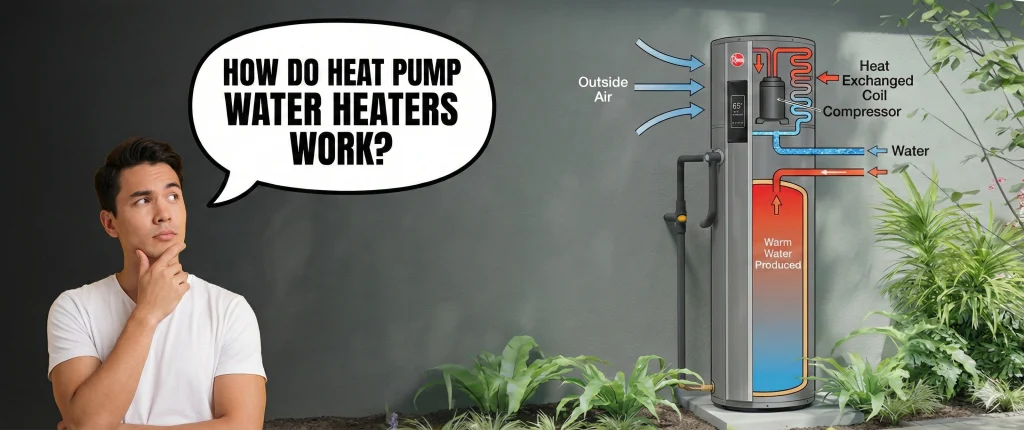
Ever wondered how you can heat your water using the air around you? It might sound like magic, but it’s […]

In Australia, ARENAWIRE reports that about 25% of home energy usage goes to heating domestic water. This process generates nearly one-fifth of residential greenhouse gas emissions nationally. The two predominant methods are gas and electric water heaters.
Gas systems make up over 40% of domestic hot water setups across the country, while electric heaters account for a substantial 50% share.
As these are the most widespread solutions for heating water in Australian homes, they contribute significantly to the nation’s carbon footprint and overall energy consumption.
Now considering that the Australian government aims to achieve net zero emission by 2050, this raises the question: are there more sustainable hot water heating alternatives that can drive this? When answering this question, heat pumps come to the forefront.
But what exactly are heat pumps, and why are they considered the best alternative to replace gas and electric water heaters in Australia?
Pay attention as we explore all the reasons that make heat pumps the future of Australia’s domestic water heating.
Heat pumps stand out as the future of domestic water heating in Australia due to their remarkable energy efficiency. Unlike the traditional electric methods that rely on electricity to generate heat for warming water, heat pumps thermodynamically capture heat from the surroundings and transfer it to stored water.
So, electricity in the heat pumps isn’t used for generating heat but rather only for transferring the captured refrigerant heat from the air to the water. This innovative approach makes heat pumps highly energy-efficient, requiring just a fraction of the electricity needed by instantaneous electric heaters.
According to Climate Choices – ACT Government, heat pumps can achieve 300% – 400% efficiencies or a CoP of 3 – 4.
That’s like saying when a heat pump uses a unit of electricity, it produces three to four units of heat energy, which makes these systems a highly efficient and cost-effective option for water heating in Australian households.
The next reason why heat pumps are the future of water heating in Australia is that they excel at saving costs. While their upfront costs might seem high, the long-term financial rewards are significant.
This is due to the fact that these hot water systems require far less energy to heat water. The lower energy requirements translate into noticeable savings that add up over time.
From Climate Choices – ACT Government data, a quality heat pump installation totals $5,500, while standard electric or gas systems cost around $1,800.
Annually, heat pumps cost $478 to run versus $1,435 for standard electric units. If you do some quick calculations, you will clearly see that heat pump hot water systems need only 4 to 6 years to pay back the initial investment.
On top of that, the Australian government and local authorities step in to make heat pump hot water systems even more affordable by offering incentives and rebates that pay for a significant percentage of the amount needed to install heat pumps. This lessens the burden and encourages more Aussies to go for heat pumps.
Heat pumps are also becoming Aussie favourites thanks to their eco-friendly nature. As you already know by now, they extract warmth from the surrounding air, transferring it to the water storage tank.
Since this process doesn’t involve burning fossil fuels, heat pumps emit minimal greenhouse gasses during their operation, unlike traditional gas or electric resistance water heaters.
This makes heat pumps an environmentally conscious choice for hot water systems.
The National Seniors Australia states that a heat pump using average Australian electricity from the grid will cut emissions by about a quarter relative to gas and three-quarters compared to an electric fan or panel heater.
So, upgrading to a heat pump hot water heater will cut down on your carbon footprint and accelerate achieving the government vision of net zero emission by 2050.
In addition to the aforementioned advantages, heat pump hot water systems are known for their durability and low maintenance requirements. These systems boast a longer lifespan compared to conventional water heaters, often lasting for 15 to 20 years or more with proper care and attention.
This is in stark contrast to electric or gas heaters, which typically require replacement after 10 to 15 years of use.
The reason behind this is the absence of a continuous burning flame or heating element and components that usually degrade and necessitate replacement in traditional water heating systems.
Moreover, heat pumps demand minimal upkeep, decreasing overall costs. The Energy Saver suggests regular cleaning and yearly professional checks to ensure smooth operation.
In contrast, gas heaters require frequent servicing and safety inspections to ensure correct and safe functioning.
The durability and low maintenance requirements of heat pumps make them a sustainable, cost-effective, long-term choice, solidifying their status as Australia’s favourite future hot water system.
Heat pumps and solar panels make a remarkable duo. Combining their forces can provide a sustainable and budget-friendly way to heat water.
By integrating the two, you can even eliminate dependency on utilities and cut down carbon emissions completely. During the daytime, excess solar electricity powers the heat pump and at night, you can use the stored charge on the battery.
This would essentially give you free hot water. And even if the solar system can’t fully meet the heat pump’s needs, it still cuts electricity usage from the grid significantly.
Furthermore, some pumps have helpful features like the option to program them to run when solar panels generate peak energy. This uses more solar power and reduces reliance on the grid, thereby lowering costs and promoting a sustainabl,e reliable system.
The hot water supply remains consistent throughout the year with hot water heat pumps. Unlike solar water heaters, which can experience difficulties during cold or cloudy periods, heat pumps extract warmth from the air even in relatively low temperatures.
As per Climate Choice ACT, they continue functioning effectively down to approximately -10°C, providing hot water reliably even in winter conditions.
For colder climate regions, this characteristic proves advantageous, as other renewable energy sources like solar may not offer the same efficiency or reliability in such conditions.
The consistent performance of heat pumps, regardless of the season, makes them a dependable and attractive option for Australian households, further contributing to their popularity and potential as the future of hot water systems in the country.
The above reasons illustrate why heat pump hot water systems are gaining popularity in Australia. If you’re considering an upgrade, now is an opportune time to invest in a future-ready hot water system that can cut costs and carbon footprint.
Connect with us today to gain further insights and leverage the available incentives and rebates. Let’s embrace the future of hot water together and contribute to a sustainable tomorrow!